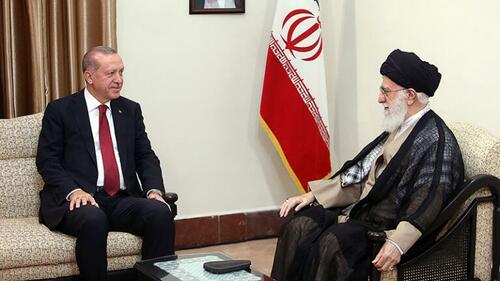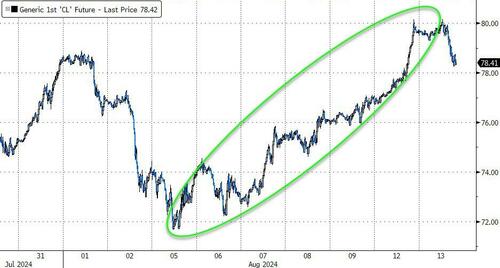
By Tsvetana Paraskova of OilPrice.com
The United States is calling on its allies that also maintain relations with Iran to persuade them not to escalate further the tensions in the Middle East, the U.S. Ambassador to Turkey, Jeff Flake, said.
“We ask all of our allies that have any relations with Iran to prevail on them to de-escalate, and that includes Turkey,” Flake told reporters in Istanbul, as carried by Reuters.
Turkey officials with whom the U.S. is talking “seem more confident than we are that it won't escalate,” the ambassador said of the current situation in the region.
The recent escalation of tensions in the Middle East has rekindled concerns about a direct conflict between Israel and Iran after Israel killed Hamas’s political leader Ismail Haniyeh in Iran and a senior Hezbollah official in Lebanon.
The region and Israel’s allies are bracing for some kind of retaliatory attack from Iran on Israel. Fears of an escalating conflict have increased the geopolitical premium in crude oil prices.
After the market meltdown over concerns about a possible U.S. recession early last week, prices jumped at the end of the week and on Monday, amid anxiety over what Iran’s response to the Israeli assassinations would be and when it would come.
Brent Crude prices returned to above $80 per barrel on Monday as tensions in the Middle East continue to run high and as some analysts expressed views that the U.S. Fed has managed a soft landing of the economy and no recession is in the cards.
After the spike on Monday, oil prices were down by 0.4% in Asian trade on Tuesday amid renewed concerns about global oil demand.
OPEC on Monday cut its forecasts of global oil demand growth this year and next, in the first downward revision since the organization issued its initial estimate for 2024 a year ago. Underwhelming data so far this year and expectations of softening Chinese demand growth weighed on OPEC’s latest demand forecast.
By Tsvetana Paraskova of OilPrice.com
The United States is calling on its allies that also maintain relations with Iran to persuade them not to escalate further the tensions in the Middle East, the U.S. Ambassador to Turkey, Jeff Flake, said.
“We ask all of our allies that have any relations with Iran to prevail on them to de-escalate, and that includes Turkey,” Flake told reporters in Istanbul, as carried by Reuters.
Turkey officials with whom the U.S. is talking “seem more confident than we are that it won’t escalate,” the ambassador said of the current situation in the region.
The recent escalation of tensions in the Middle East has rekindled concerns about a direct conflict between Israel and Iran after Israel killed Hamas’s political leader Ismail Haniyeh in Iran and a senior Hezbollah official in Lebanon.
The region and Israel’s allies are bracing for some kind of retaliatory attack from Iran on Israel. Fears of an escalating conflict have increased the geopolitical premium in crude oil prices.
After the market meltdown over concerns about a possible U.S. recession early last week, prices jumped at the end of the week and on Monday, amid anxiety over what Iran’s response to the Israeli assassinations would be and when it would come.
Brent Crude prices returned to above $80 per barrel on Monday as tensions in the Middle East continue to run high and as some analysts expressed views that the U.S. Fed has managed a soft landing of the economy and no recession is in the cards.
After the spike on Monday, oil prices were down by 0.4% in Asian trade on Tuesday amid renewed concerns about global oil demand.
OPEC on Monday cut its forecasts of global oil demand growth this year and next, in the first downward revision since the organization issued its initial estimate for 2024 a year ago. Underwhelming data so far this year and expectations of softening Chinese demand growth weighed on OPEC’s latest demand forecast.
Loading…






